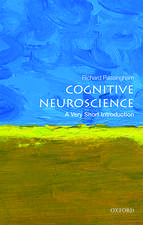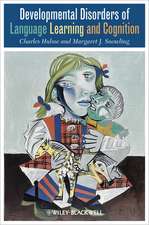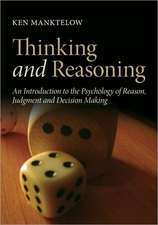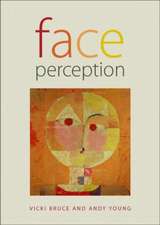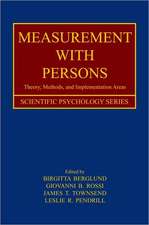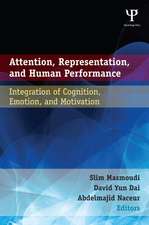Who Is Rational?: Studies of individual Differences in Reasoning
Autor Keith E. Stanovichen Limba Engleză Hardback – apr 1999
In a comprehensive set of studies, Stanovich demonstrates that gaps between normative and descriptive models of performance on some tasks can be accounted for by positing these alternative explanations, but that not all discrepancies from normative models can be so explained. Individual differences in rational thought can in part be predicted by psychological dispositions that are interpreted as characteristic biases in people's intentional-level psychologies. Presenting the most comprehensive examination of individual differences in the heuristics and biases literature that has yet been published, experiments and theoretical insights in this volume contextualize the heuristics and biases literature exemplified in the work of various investigators.
| Toate formatele și edițiile | Preț | Express |
|---|---|---|
| Paperback (1) | 426.20 lei 6-8 săpt. | |
| Taylor & Francis – mar 1999 | 426.20 lei 6-8 săpt. | |
| Hardback (1) | 1010.26 lei 6-8 săpt. | |
| Taylor & Francis – apr 1999 | 1010.26 lei 6-8 săpt. |
Preț: 1010.26 lei
Preț vechi: 1232.02 lei
-18% Nou
Puncte Express: 1515
Preț estimativ în valută:
193.31€ • 202.38$ • 159.95£
193.31€ • 202.38$ • 159.95£
Carte tipărită la comandă
Livrare economică 05-19 aprilie
Preluare comenzi: 021 569.72.76
Specificații
ISBN-13: 9780805824728
ISBN-10: 0805824723
Pagini: 312
Dimensiuni: 152 x 229 x 6 mm
Greutate: 0.74 kg
Ediția:New.
Editura: Taylor & Francis
Colecția Psychology Press
Locul publicării:Oxford, United Kingdom
ISBN-10: 0805824723
Pagini: 312
Dimensiuni: 152 x 229 x 6 mm
Greutate: 0.74 kg
Ediția:New.
Editura: Taylor & Francis
Colecția Psychology Press
Locul publicării:Oxford, United Kingdom
Public țintă
ProfessionalCuprins
Contents: Preface. Conceptualizing Rationality: Some Preliminaries. Performance Errors and Computational Limitations, With R.F. West.The Inappropriate Norm Argument. The Problem of Rational Task Construal. Dual-Process Theories and Evolutionary Adaptation Versus Normative Rationality. Thinking Dispositions and Decontextualized Reasoning, With R.F. West, W.C. Sá.The Fundamental Computational Bias. Has Human Irrationality Been Empirically Demonstrated?
Recenzii
"Stanovich and his colleagues have done an absolutely remarkable job in exploring individual differences. I think this will be the definitive work on this topic for decades. The book...is necessary reading for anyone who plans to work on this topic, whether as a philosopher or a psychological researcher."
—Contemporary Psychology
"This is an important book."
—Informal Logic
"This is an ambitious book. Any book that sets out with the goal of addressing fundamental issues of human rationality has its work cut out for it. What is impressive about this book is the extent to which it succeeds: Stanovich poses an interesting question and examines the issue from a novel prespective. The scholarship of the book is impressive, and his command of the literature and analysis of the issues produce a thoughtful and thoroughly articulated viewpoint. His arguments are carefully reasoned, and are supported by meticulous and rigorous experimental evidence.
"...it is an excellent summary of the important issues and current perspectives in the rationality debate, readers interested in knowing more about the broader issues are also likely to find this book to be a useful source."
—Canadian Journal of Experimental Psychology
"The results of this project contribute to resolving the on-going debate over whether humans are fundamentally rational or irrational creatures. No one with a strong interest in judgment, decision-making, reasoning, rationality, or thinking styles should overlook this interesting, readable, and well-organized book....This book says something new and important about human rationality and is a great contribution to the field."
—Cognitive Science Society Newsletter
"The book is clearly structured and easy and interesting to read. All major arguments, positions and empirical studies relevant to the topic are discussed..."
—Theory & Psychology
"This book gives the definitive account of the relation between reasoning ability and intelligence."
—Philip Johnson-Laird
Princeton University
"This book describes an important project which shows consistent individual differences across a variety of reasoning problems. The consistencies involve a much wider range of tasks than those that have been studied before in this way. The tasks include many of those used to study fallacies and biases in judgments, decisions, and reasoning. The findings constrain what can be said about the relevance of normative models to prescriptive and descriptive models of judgment and reasoning. For example, they raise a problem for the view that prescriptive models designed to improve reasoning (according to the usual normative standards) are self-defeating. This book will be of interest to scholars at all levels with interests in reasoning, judgment, decision making, and individual differences in mental abilities, as well as to those in social and developmental psychology who have explored related issues."
—Jonathan Baron
University of Pennsylvania
"This remarkable book has emerged from an exciting research programme which provides some of the clearest evidence to date that the study of individual differences in task performance can lead to theoretical advances in our understanding of mental processes. Professor Stanovich provides a discussion of rationality and thought processes which is equally impressive for its breadth of scholarship as for its depth of intellectual argument. The issues he discusses are of central importance for cognitive scientists and deserve attention from all serious students of this fascinating topic."
—Jonathan Evans
University of Plymouth
—Contemporary Psychology
"This is an important book."
—Informal Logic
"This is an ambitious book. Any book that sets out with the goal of addressing fundamental issues of human rationality has its work cut out for it. What is impressive about this book is the extent to which it succeeds: Stanovich poses an interesting question and examines the issue from a novel prespective. The scholarship of the book is impressive, and his command of the literature and analysis of the issues produce a thoughtful and thoroughly articulated viewpoint. His arguments are carefully reasoned, and are supported by meticulous and rigorous experimental evidence.
"...it is an excellent summary of the important issues and current perspectives in the rationality debate, readers interested in knowing more about the broader issues are also likely to find this book to be a useful source."
—Canadian Journal of Experimental Psychology
"The results of this project contribute to resolving the on-going debate over whether humans are fundamentally rational or irrational creatures. No one with a strong interest in judgment, decision-making, reasoning, rationality, or thinking styles should overlook this interesting, readable, and well-organized book....This book says something new and important about human rationality and is a great contribution to the field."
—Cognitive Science Society Newsletter
"The book is clearly structured and easy and interesting to read. All major arguments, positions and empirical studies relevant to the topic are discussed..."
—Theory & Psychology
"This book gives the definitive account of the relation between reasoning ability and intelligence."
—Philip Johnson-Laird
Princeton University
"This book describes an important project which shows consistent individual differences across a variety of reasoning problems. The consistencies involve a much wider range of tasks than those that have been studied before in this way. The tasks include many of those used to study fallacies and biases in judgments, decisions, and reasoning. The findings constrain what can be said about the relevance of normative models to prescriptive and descriptive models of judgment and reasoning. For example, they raise a problem for the view that prescriptive models designed to improve reasoning (according to the usual normative standards) are self-defeating. This book will be of interest to scholars at all levels with interests in reasoning, judgment, decision making, and individual differences in mental abilities, as well as to those in social and developmental psychology who have explored related issues."
—Jonathan Baron
University of Pennsylvania
"This remarkable book has emerged from an exciting research programme which provides some of the clearest evidence to date that the study of individual differences in task performance can lead to theoretical advances in our understanding of mental processes. Professor Stanovich provides a discussion of rationality and thought processes which is equally impressive for its breadth of scholarship as for its depth of intellectual argument. The issues he discusses are of central importance for cognitive scientists and deserve attention from all serious students of this fascinating topic."
—Jonathan Evans
University of Plymouth
Descriere
This volume reviews a body of research on individual differences in thinking and reasoning and brings his conclusions to bear on the longstanding debate over whether people "are" or "are not" rational thinkers. For cognitive scientists and educators.


